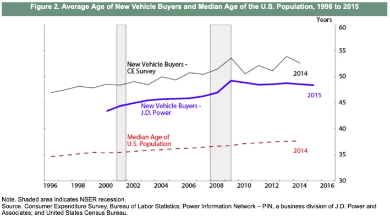Are Young People Buying Fewer Cars?
It’s 2019, and the youth is becoming increasingly environmentally conscious. One would imagine that this generation is less inclined to buy new cars that are expensive and bad for the environment. In 2013, evidence supporting this conclusion came to light. In a widely acknowledged piece titled “The End of Car Culture,” The New York Times claimed that there were downward trends in car ownership rates and the number of young drivers was falling. Young people chose instead to share or rent cars, use public transportation or hail rides. An entire ride hailing industry is predicated on this trend.
To assess the claim that young people bought fewer cars, we first need to consider the significant changes in the US new light vehicle market. Firstly, it should be noted that US sales of new light vehicles have rebounded strongly since the end of the Great Recession. Sales totaled 17.2 million, which was close to the all-time record set in 2000. Secondly, the age distribution of buyers changed significantly over the last two decades. The average age of new vehicle buyers rose from 43-1/2 years in 2000 to more than 49 years in 2009. The average age stepped up the most in 2009, the first year after the financial crisis, and it has stayed relatively constant since the Great Recession.

The ageing population in the US accounts for some of the change in the average age of buyers. But in general, young people are buying less cars than older generations. The share of New Light Vehicles Purchased by 16-24 year olds fell from 28.6% in 2000 to 22.6% in 2015. This 6% decrease indicates that even though the overall sales are high, young people now are less likely to buy cars than the generation before them.
So why are young people less likely to buy new vehicles? Contrary to popular belief, this shift in demographic is not caused by a change in the preferences of young people but because of their increased price sensitivity. Economic constraints loom larger over this generation than before, and the age at which young people become financially independent is increasing. When controlling for whether young adults have become economically independent from their parents, Nicholas Klein from Columbia University and Michael Smart from Rutgers found that economically independent young adults own slightly more cars than their predecessors did given the same age and income.
Young people are buying fewer cars, which has created a market for all kinds of alternative transportation. We have seen the rise of Uber, Lyft, Lime, and Zipcar. But if young people are buying fewer vehicles because of economic constraints, this trend might reverse with better economic conditions, and the opportunity for alternative transportation might vanish.
Interview with NASA Astronaut Scott Kelly: An American Hero
13 Questions With General David Petraeus
Why Choose Machine Learning Over A Traditional Financial Advisor?
Nuclear Submarines: A 7,000 Lb Swiss Watch
Interview with the Inventor of Amazon's Alexa
Ai Can Write Its Own Computer Program
On Black Holes: Gateway to Another Dimension, or Ghosts of Stars’ Pasts?
Supersonic Travel: The Future of Aviation
Conversation with Bloomberg's Former Head of Trading on the Future of Humans in the Trading Industry
Shedding Light on Dark Matter: Using Machine Learning to Unravel Physics’ Hardest Questions
The Implications of Machine Learning on Condensed Matter Physics & Quantum Computing
Libya Offers Promise But Much Risk
Lockheed Martin Confirms the SR-72 – Son of Blackbird Will Reach Anywhere in the World in One Hour
Written by Sonakshi Dua & Edited by Alexander Fleiss